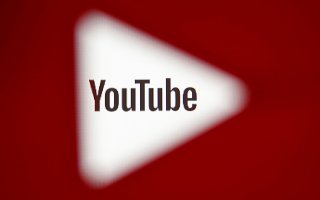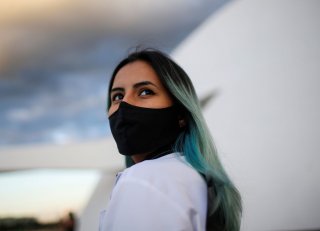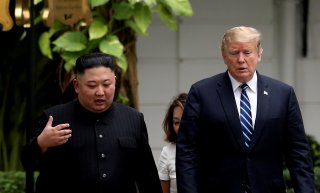President Donald Trump started with a strategy custom-built for great-power competition. He has delivered. Arguably, the American competitive position against China, North Korea, Russia and Iran is now stronger than it was four years ago.
International organizations used to play an inconsequential role in the great-power squabbling. That has changed. The World Health Organization (WHO) effectively stabbed the West in the back when it allowed Beijing to manipulate it into spreading fatally false information about the coronavirus crisis.
It is now clear that America’s strategy for great-power competition needs a new plank. In addition to facing-off against China at sea, in the marketplace and online, Washington needs a better game plan for besting Beijing at the United Nations and other international forums.
The Reluctant Globalist
In some respects, the problems posed by China in global forums represent nothing new. One of the shortfalls of international organizations is that every nation-state has a right to play, but not all states play fair. Nations like the U.S. respect popular sovereignty, human rights and free enterprise. States like China don’t. No matter. They all get to participate.
Some might think these organizations aren’t worth worrying about. They are. Global institutions can impact the everyday lives of Americans. How? The International Civil Aviation Organization (ICAO) manages the implementation of the convention that governs civilian air travel worldwide. The International Maritime Organization (IMO) sets the rules for the safety and security of maritime transport worldwide. The Internet Corporation for Assigned Names and Numbers is the Internet’s traffic cop.
We voluntarily participate in these organizations because they provide tangible benefits. For example, after 9/11, the United States led an effort at the IMO to establish new international shipping and port security codes to reduce the threat of terrorism at sea. Although some are more important than others, the United States cannot afford to simply international organizations.
The popular critique that Trump eschews international organizations and cooperation is demonstrably false. Critics point to examples like the U.S. withdrawal from the Paris Climate Accords, claiming they reflect the totality of how Washington treats the world. That is simply not true.
In the first two years of Trump’s presidency, for example, the administration signed thirteen international agreements. That’s only one less than the same period in the Obama administration. More recently, the United States led the fight to prevent China’s candidate from taking the lead of the World Intellectual Property Organization, a clear example that Washington isn’t indifferent to the importance of these organizations. The United States is tracking at least six upcoming elections that could impact U.S. interests.
In practice, the Trump team acts pretty much like a typical Republican administration: skeptical of international organizations and the potential threats to national sovereignty, but willing to engage when it serves American interests.
Acting the reluctant internationalist, however, won’t cut it anymore. And that’s largely because of China. The Chinese Communist Party has a deliberate strategy of placing individuals who are answerable to the party in high posts at international organizations. Chinese nationals are already in charge of four of the UN’s key fifteen specialized agencies. Recently one of them, Houlin Zhao, secretary-general of the International Telecommunication Union, declared that opposition to Huawei, the Chinese telecom company was “political.” In reality, the company has raised significant national security concerns. Zhao’s outrageous comments are just the ice shavings on the tip of the iceberg.
If the United States does not counter the Chinese Communist Party’s assault, then Beijing will bend global norms, removing any obstacles to the expansion of Chinese power. American interests can’t be protected unless the U.S. takes a more proactive and constructive role.
Managing Global Mayhem
There is no “silver bullet” strategy for achieving this goal. The importance, structure, and agendas among international organizations are too varied to apply one approach across the board.
One option is to just walk away. Sometimes, this is a legitimate choice, such as when President Bill Clinton chose to leave the UN Industrial Development Organization because the organization lacked clear purpose, or when the Trump administration left UNESCO because the decision to grant membership to the Palestinians prevented the United States from providing funding.
Other times, however, leaving could be more costly than staying. There is, for example, a Congressional proposal to withdraw from the World Trade Organization. “Job one” right now has to be to get the U.S. economy and those of America’s key strategic friends and allies up and running. Disrupting the basis for America’s international trade regime would impede that goal.
Another option is to create new organizations to supplant those that are not adequately performing critical functions—an idea most recently pitched by Ash Jain and Matthew Kroenig. But there are pitfalls to starting over. If international organizations seem out of whack now, think about what it would be like if the UN Charter were drafted today under the guidance of China, the European Union, the Group of seventy-seven, and liberal non-governmental organizations. U.S. influence would be greatly diminished.
For instance, just based on recent reform proposals, the UN Security Council would be much larger and many would prefer that no nation have a veto. Because negotiations would have to engender support from a large majority of governments, we can be sure that the mandated responsibilities and powers of the new organization would be far more expansive to placate the agendas of these countries. This is a case where it is smarter to try to reform from within because any new universal-membership replacement would be worse, and any non-universal membership replacement would leave the bad actors in charge of the UN with all of its historical, legal authority that many nations respect.
Moreover, at this point, this administration is not in a position to be able to lead a decisive effort of replacement. U.S. international leadership is not as hamstrung as critics contend, but the administration certainly has perception problems in this area. Consider, for example, the recent unfair criticism leveled at the administration for not participating in a COVID vaccine donor conference.
Further, the White House has still not filled out its diplomatic team. A number of vital positions are either still vacant or lack qualified, dependable political appointees. In particular, the administration’s “IO” team has seen a great deal of churn over the past three years.
The bottom line: Nothing substantive is going to happen in the short term. For Trump to do something really meaningful about “fixing” international organizations, he will first have to put the right team in place to do it; develop a fulsome strategy; lay the groundwork with allies, and dedicate his second-term to implementing change. If Trump loses the election, nothing will happen. The liberal establishment will never bring itself to apply the pressure and leverage necessary to achieve real, meaningful reform.
Reforming the World
An effective U.S. strategy for international organizations should be a hybrid, a combination of withdraw, reform, and replace.
These three tactics all share one thing in common: the more broadly they are supported by the free world, the better the outcomes they will produce. This means we must line up in support, in advance, among nations that respect human dignity, enterprise, and liberty.
How do we do that? By investing more smartly in better governance, security and economic freedom, including better instruments of public diplomacy. Further, the United States has to lead the free world in economic recovery. We need strong, confident partners to take on the challenge of illiberalism. If free countries align and act together, they can lead international organizations toward desired outcomes. Of course, this also requires that they approach the organizations with clear-eyed realism rather than a starry-eyed vision of benign global governance—an attractive yet dangerous chimera.
Withdraw. We should skip, marginalize, punish and ignore organizations that have simply become the devil’s playground, no longer capable of delivering real value. The Human Rights Council is a good example.
The council has become captured by states hostile to basic human rights and fundamental freedoms. The United States can and should continue to press for reforms. There is, however, no reason to rejoin unless reforms are actually made because changes are necessary to ensure that the council actually becomes a force for good.
Likewise, the United States has no reason to rejoin the UN World Tourism Organization. Punishing the International Criminal Court for overstepping its jurisdiction, is another good example of the kinds of steps the United States should take to mitigate the threat of bad behaviors from international organizations.
Reform. Some organizations (e.g. ICAO and IMO) require universal membership to fulfill their functions; some do not. Those that require global participation need determined and consistent U.S. leadership. The WHO is a case in point. The organization’s mission includes detecting and coordinating a response to international pandemics that requires a modicum of cooperation with all nations. Sadly, most of WHO resources are focused elsewhere—on non-communicable diseases, corporate services and other initiatives that do not address cross-border threats to health.
An effective approach to communicable diseases requires a global effort. Otherwise, they can crop up and spread before they are detected. If the WHO cannot be reformed to fill this function effectively, then America should seek to set up an alternative, but it needs to include all nations. That will be a much heavier lift than fixing the WHO.
Replace. Where organizations with a critical mission are failing and can’t be fixed, then America should establish new international organizations and frameworks. It should be brave enough to be bold and not dismiss the value of new freedom-oriented organizations. It should ignore the critics who think changing, abandoning or replacing an ineffective status quo is selfish and isolationist.
In some cases, these frameworks do not need to be new international organizations, per se. To build a likeminded consensus that can be used to influence the behavior of international organizations, the United States can work through informal networks like the Quad, existing multinational organizations like NATO, or new strategic alliances, such as a Middle East framework. The mounting pressure to readmit Taiwan to the WHO is a good example of a joint effort by like-minded nations seeking to right an unjust act.
A Free World Free Trade Agreement to complement or supplant the WTO might be an approach worth considering. In 2001, analysts at the Heritage Foundation proposed a Global Free Trade Agreement, under which nations meeting established standards of free trade and investment practices could agree to further reduce or eliminate their trade barriers, minimizing the need for lengthy negotiations that often hamper bilateral or multilateral trade deals.
The time is ripe to stitch together a reform, withdraw, replace plan and lead the free world in using international organizations to protect and expand freedom around the world.







